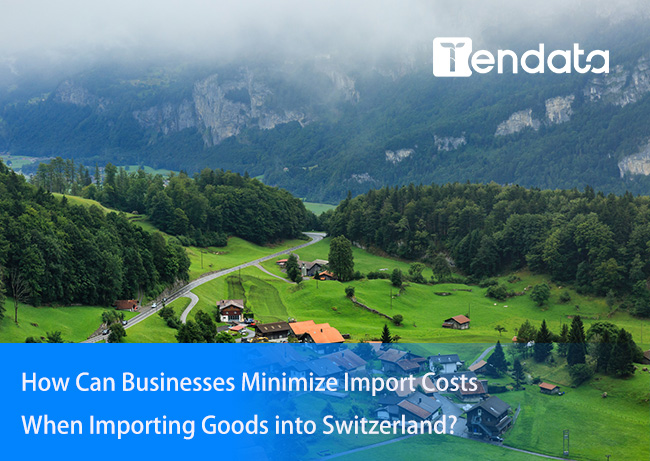 Import News
Import News
 14-03-2024
14-03-2024
Importing goods into Switzerland can be a lucrative endeavor, given the country's stable economy and affluent consumer base. However, it's crucial for businesses to navigate the complex landscape of import costs to ensure profitability. In this comprehensive guide, we will explore strategies for calculating and minimizing import costs when importing goods into Switzerland.

1. Understanding Swiss Import Duties and Taxes
Before delving into strategies for cost reduction, it's essential to understand the key components of import costs in Switzerland:
· Customs Duties: Switzerland imposes customs duties on various goods based on their classification, origin, and value.
· Value-Added Tax (VAT): VAT is levied on the value of goods, including customs duties, shipping, and insurance costs.
· Excise Taxes: Certain goods like alcohol and tobacco may be subject to excise taxes.
2. Accurate Product Classification
To calculate import costs accurately, it's crucial to classify your products correctly according to the Swiss Customs Tariff. This classification determines the applicable customs duties. Misclassifying products can result in higher import costs or legal issues. Therefore, seeking expert advice or using classification software is advisable.
3. Preferential Trade Agreements
Switzerland has signed several free trade agreements (FTAs) with various countries and regions. Importing goods from FTA partners can significantly reduce or even eliminate customs duties. Ensure that your products qualify for preferential treatment under these agreements and take advantage of them to minimize import costs.
4. Calculate Total Landed Costs
To make informed decisions and manage cash flow effectively, calculate the total landed costs, including:
· Purchase Price: The cost of the goods.
· Transportation Costs: Shipping, freight, and insurance expenses.
· Customs Duties and Taxes: Customs duties, VAT, and excise taxes.
· Handling and Storage: Fees for customs clearance, warehousing, and handling.
By considering all these elements, you can have a comprehensive view of your import costs and identify areas for optimization.
5. Optimize Shipping and Logistics
Selecting the right shipping and logistics providers can significantly impact import costs. Consider:
· Incoterms: Choose the appropriate Incoterms that specify the responsibilities and risks between the buyer and seller.
· Consolidation: Consolidating shipments when possible to reduce transportation costs.
· Transportation Modes: Explore various transportation modes to find cost-effective solutions.
6. Use Customs Procedures
Switzerland offers various customs procedures that can help reduce import costs:
· Customs Warehousing: Goods can be stored in a customs warehouse, deferring customs duties and taxes until the goods are released for the Swiss market.
· Temporary Admission: For specific purposes like exhibitions, you can temporarily import goods without paying customs duties and taxes.
7. Consult with Experts
Navigating the complexities of Swiss import regulations and cost calculations can be challenging. Consider seeking advice from customs experts or consultants who specialize in Swiss imports. They can help you identify cost-saving opportunities and ensure compliance with regulations.
8. Continuous Review and Compliance
Swiss import regulations and taxes can change over time. Regularly review your import strategy to ensure compliance with the latest requirements and identify new opportunities for cost reduction.
In conclusion, importing goods into Switzerland requires a meticulous approach to calculate and minimize import costs. By understanding the components of import costs, utilizing preferential trade agreements, accurate product classification, and optimizing logistics, businesses can enhance their competitiveness and profitability in the Swiss market.
About Tendata
If you want to expand your export business and want to find out if there are export opportunities, there is much more you need to do! It may take a lot of time to conduct market research. Want to start your export business as fast as possible? Tendata can help you save up to 90% of your time!
Tendata provides real-time updated import and export data and customs data of 220+ countries, dynamically records the transaction details of each import and export goods, accurately mines and analyzes real buyers around the world based on big data AI intelligent technology, and easily matches the name, identity, position, email address, phone number and social account of the person in charge of purchasing in 10 seconds, which can satisfy all kinds of needs such as searching for overseas buyers, monitoring competitors, grasping market trends, improving enterprise competitiveness and so on. It can help you find overseas buyers, monitor competitors, grasp market trends, improve enterprise competitiveness and other needs, and help you quickly increase your company's revenue.

Category
Leave Message for Demo Request or Questions


 T-info
T-info T-discovery
T-discovery

 My
Tendata
My
Tendata Market Analysis
Market Analysis Customer
Development
Customer
Development Competitor
Monitoring
Competitor
Monitoring Customer Relationship
Customer Relationship





































































































































